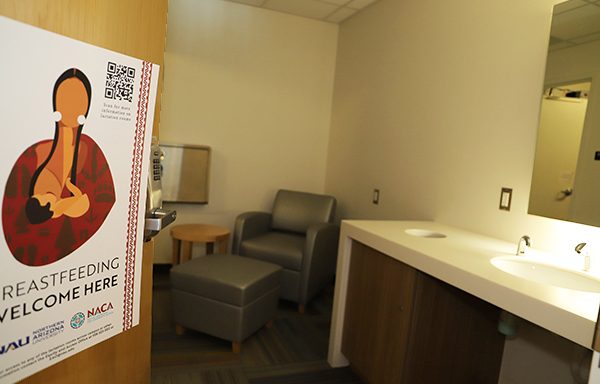Improving life for new parents

Lactation Spaces Committee assists with developing culturally relevant lactation spaces
When Native Americans for Community Action (NACA) received a grant from the Centers for Disease Control and Prevention in October 2019, they decided to use part of it to increase breastfeeding awareness in the Flagstaff community—an important yet often overlooked necessity for parents.
Meanwhile, at Northern Arizona University, several individuals including Alisse Ali Joseph, assistant professor in the Department of Applied Indigenous Studies, Kelly McCue, senior research coordinator for the Center for Health Equity Research, and Lauren Copeland-Glenn, senior executive officer and affirmative action analyst for the Equity and Access Office, were examining ways to improve NAU’s lactation spaces.
“Dr. Ali Joseph was working with NACA on a grant and realized we were all working toward the same goal. After a few meetings we decided to form a committee and work together,” McCue said.
The Lactation Spaces Committee now meets regularly with a mission to develop innovative solutions to improve lactation access and support on the NAU campus. Proposed solutions include mapping current lactation space locations; creating a university policy; and identifying funding to add spaces, either in rooms or mobile “pods,” such as Mamava pods, that can provide lactation space within any available area. Minimally, they aim for every space to include a locking door with a privacy feature, power source, table, sink, and comfortable chair.
With funds from NACA, the team created sturdy, poster-sized signs to post on the doors of all lactation spaces across campus. The posters feature an Indigenous woman breastfeeding a child and a QR code that links to the NAU Lactation Spaces website.
“NACA inspired us to create this community,” said Ali Joseph. “It was a labor of love, and this is an awesome, powerhouse of a group.”
The committee also recently held an Indigenous Lactation Support Panel at the NAU Native American Cultural Center and online with five panelists that included Indigenous women from northern Arizona who shared their experience with breastfeeding in a group discussion.
Tenillya Cody, who worked at NACA during the initial stages of the lactation committee, said that NACA hopes to increase the Flagstaff community business locations that implement culturally adapted continuity of care and community support strategies to promote and support breastfeeding.
“And it’s nice to like know you all [at NAU] are very passionate about this approach [to supporting breastfeeding] and it is something that I think every organization needs to have,” said Cody.
Other members of the committee include Kiara Weathersby, manager, student development, Indigenous Student Success; Brooke de Heer, assistant professor, Department of Criminology and Criminal Justice; Victoria Fimea, senior executive officer and affirmative action analyst for the Equity and Access Office; Frances Riemer, interim director, Women’s and Gender Studies and professor, Center of Excellence: Educational Leadership Department of Women’s and Gender Studies; Pamela Powell, associate dean and associate professor, College of Education; and Sheena Hale, assistant director, Student Life Experience, Office of Inclusion. Also on the committee from NACA were Brittany Benally, program evaluator; Cody, who now works as a program manager for North Country HealthCare; and Kamia Yazzie, who now works for the Arizona Department of Health Services.
The NAU Flagstaff campus now has 14 dedicated lactation rooms. NAU’s Equity and Access Office (EAO) manages the university’s lactation rooms available to faculty, staff and students in the NAU community, including visitors. They are located in different areas on the Flagstaff Mountain Campus and have restricted, keycode access to ensure privacy.
The EAO also works with members of the NAU community who are not in Flagstaff to provide lactation spaces at the university’s locations throughout the state.
Over time, the group would like to identify funding to increase the number of spaces throughout all of NAU and ensure that each building has a designated lactation space.
“Management of the rooms is important to ensure those who need the room have access,” Fimea said. “We are working to develop more rooms to maximize the convenience of locations on campus.”
Importance of accessible and private lactation spaces
According to NACA, breastfed babies are less likely to have ear infections, diarrhea, colds and flu. The CDC Division of Nutrition, Physical Activity and Obesity said that breastfeeding also improves the health of the mother and lowers her risk of high blood pressure, type 2 diabetes, and ovarian and breast cancer.
Yazzie, who worked as a program evaluator on the project for NACA at the beginning of the grant, also completed a Master’s in Public Health from NAU simultaneously.
During her second year of graduate school, she went on postpartum leave.
“I was breastfeeding, working and going to school, so it came full circle [to work on the Lactation Spaces Committee],” she said.
For her master’s project, Yazzie developed “A Literature Review on Influencing Factors That Promote Recommended Breastfeeding Practices (Exclusive for 6 Months and then Combined Until 12 Months) Among American Indian Women in the United States” and won honorable mention in an NAU graduate-level poster contest on her project.
“[During my master’s research], I found themes for what influences a breastfeeding mother, and the biggest ones were family and work,” Yazzie said.
Working toward a parent-friendly future
NAU is making advances in a variety of programs to improve the work and home balance for new parents. This month, NAU updated its parental leave benefits to give benefit-eligible parents 12 weeks of paid leave for birth and bonding.
NAU also has a new Early Learning and Development Center that will open this semester. The center will initially serve 3–5-year-olds with an enrollment of 25 students.
“Providing lactation spaces across campus supports our commitment to a diverse, inclusive, and equitable environment for everyone,” said Copeland-Glenn. “As we know, breastfeeding is not only important to the health of the child but to the parent as well. Managing and maintaining dedicated lactation spaces ensures they are available when someone needs one.”